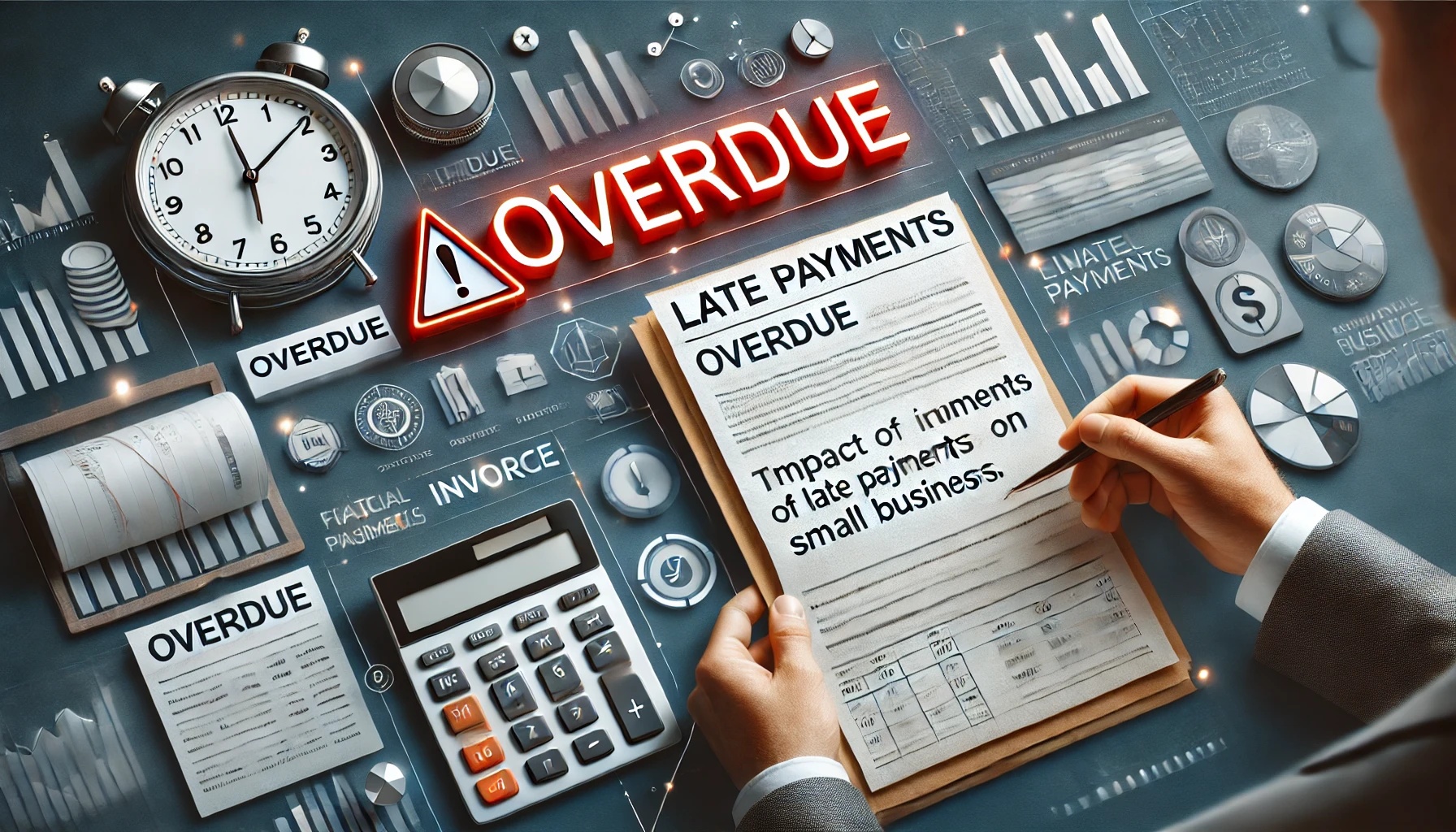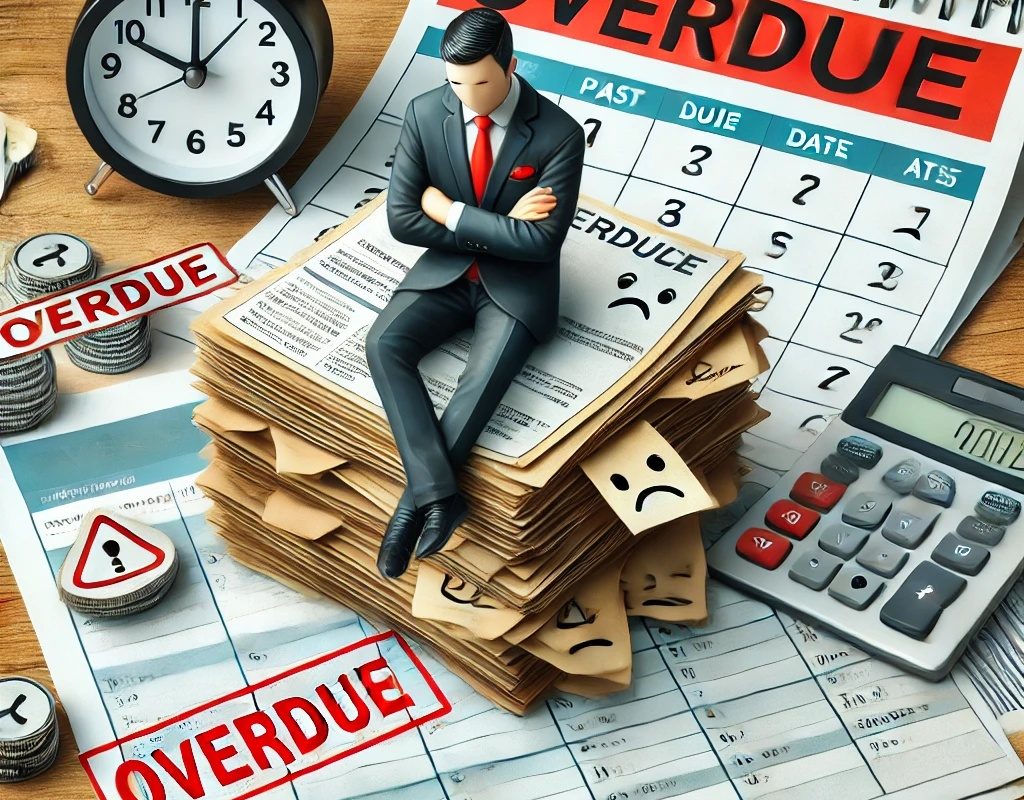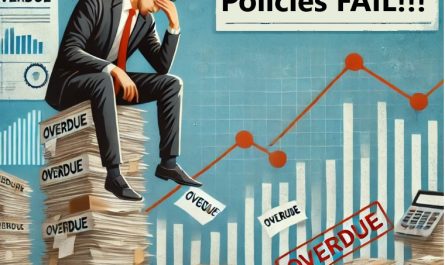Table of Contents
- 1 Introduction – Understanding the Impact of Late Payments on Small Businesses
- 2 Cash Flow Disruptions That Lead to Business Struggles
- 3 Late Payments Can Lead to Increased Borrowing Costs
- 4 Supplier and Vendor Relationships Are Damaged
- 5 Legal Risks and Additional Collection Costs
- 6 Conclusion: How Late Payments Hurt Small Business
Introduction – Understanding the Impact of Late Payments on Small Businesses
 Late payments hurt small businesses more than many owners realize. Imagine a small business owner who has just delivered a large order, eagerly awaiting payment. As the due date approaches, they check their accounts, only to find that the invoice remains unpaid. This delayed payment disrupts their cash flow, making it difficult to cover essential expenses like salaries and inventory. Many business owners think of late payments as a minor inconvenience, but the reality is far more serious. Unpaid invoices can lead to late fees, strained relationships with suppliers, and even the risk of needing a collection agency to recover what’s owed.
Late payments hurt small businesses more than many owners realize. Imagine a small business owner who has just delivered a large order, eagerly awaiting payment. As the due date approaches, they check their accounts, only to find that the invoice remains unpaid. This delayed payment disrupts their cash flow, making it difficult to cover essential expenses like salaries and inventory. Many business owners think of late payments as a minor inconvenience, but the reality is far more serious. Unpaid invoices can lead to late fees, strained relationships with suppliers, and even the risk of needing a collection agency to recover what’s owed.
In this article, we’ll explore the true impact of late payments, the risks they pose, and actionable strategies to ensure you get paid on time.
📌 Fact: Studies show that over 50% of small business owners struggle with cash flow issues due to late payments. If your small business is suffering from unpaid invoices, it’s time to take control and avoid late payments.
Cash Flow Disruptions That Lead to Business Struggles
🚨 How Late Payments Affect SME Cash Flow

- Small businesses rely on a steady cash flow to pay employees, suppliers, and operational expenses.
- Delayed payments create a cash shortage, forcing small businesses to dip into emergency funds or take out loans.
- Lack of cash flow reduces growth opportunities, making it harder to reinvest in new projects, inventory, or marketing.
- Business owners are forced to prioritize payments, sometimes choosing between paying employees or covering operational expenses.
- Unexpected cash flow shortages can result in missed business opportunities, preventing expansion or investment in new products.
- Late payments create financial unpredictability, making it harder to plan long-term growth strategies.
- Small businesses end up chasing late payments, which takes time away from core operations.
✅ How to Avoid Late Payments & Maintain Cash Flow
- Implement a clear payment process with structured terms for every invoice.
- Use early payment incentives or discounts for customers who pay ahead of time.
- Automate invoice reminders to ensure payments from customers are on time.
- Maintain a cash reserve to handle delayed payments without disrupting business operations.
- Set up invoice financing options for short-term relief without taking on additional debt.
- Charge interest and late payment fees on overdue invoices to discourage payment delays.
Late Payments Can Lead to Increased Borrowing Costs
🚨 Why Late Payments Force Small Businesses into Debt
- When invoices remain unpaid, small businesses may need to take out loans or extend credit lines to cover expenses.
- Interest rates and fees on borrowed money erode profits, reducing financial stability.
- Banks and financial institutions may see your business as high-risk, making it harder to secure future funding.
- Accruing debt due to late payments can lead to long-term financial instability, forcing small business owners to operate under continuous pressure.
- High-interest debts reduce the ability to invest in business growth, leading to stagnation.
- Late payment penalties from suppliers may result in additional financial burden.
✅ How to Reduce Borrowing Due to Late Payments
- Strictly enforce payment terms and set penalties for making late payments.
- Maintain an emergency cash reserve to avoid relying on high-interest borrowing.
- Vet customers before extending credit to minimize risk.
- Establish alternative revenue streams to reduce dependency on delayed payments.
- Consider using invoice factoring to get immediate cash from outstanding invoices.
- Charge interest on unpaid invoices to discourage delays.
Supplier and Vendor Relationships Are Damaged
🚨 How Late Payments Hurt Business-Supplier Trust
- Late payments affect your ability to pay suppliers on time, which can lead to:
- Strained relationships with key vendors.
- Loss of supplier trust, reducing access to bulk discounts or priority service.
- Suppliers demanding upfront payments, increasing cash strain on your business.
- Suppliers may prioritize more reliable clients, delaying deliveries and impacting production cycles.
- Missed payments can damage your industry reputation, making new supplier negotiations harder.
- Late payment interest and penalties may increase the overall cost of late payments.
✅ How to Strengthen Supplier Relationships
- Set up a payment schedule that aligns with supplier expectations.
- Be proactive in communicating with suppliers if facing temporary payment delays.
- Use supplier payment plans to spread costs over a manageable period.
- Develop stronger contractual agreements with suppliers that protect against financial risks.
- Negotiate better payment terms in advance, ensuring flexibility when needed.
- Avoid late payments by automating payments and setting clear payment deadlines.
Legal Risks and Additional Collection Costs
🚨 How Overdue Invoices Create Legal & Debt Collection Issues
- Persistent non-payment issues may force small businesses to hire collection agencies or take legal action.
- Legal fees and collection agency commissions eat into profit margins.
- Unpaid invoices may have to be written off as bad debt, leading to financial losses.
- Non-payment disputes can damage your business reputation, making it harder to secure future contracts.
- Customers may exploit weak collection processes, knowing they won’t face consequences.
- Adding a late payment fee or penalty can encourage customers to pay on time.
✅ How to Avoid Legal & Debt Collection Costs
- Have a structured collections process that escalates from reminders to formal action.
- Require deposits or upfront payments from high-risk customers.
- Clearly state late fees and penalties in all contracts and invoices.
- Consider using mediation services before escalating to legal action.
- Work with trusted collection partners to recover debts efficiently.
- Charge for late payments by adding a late payment interest fee.
Conclusion: How Late Payments Hurt Small Business
Late payments aren’t just a nuisance—they can threaten the survival of your business. From cash flow issues and supplier distrust to increased borrowing costs and legal risks, the consequences of unpaid invoices add up quickly.
By enforcing stronger credit control policies, vetting customers, and using structured follow-up strategies, small business owners can reduce the cost of late payments and protect their financial stability.
📥 Want to stay ahead of late payments? Click here to explore all my blogs on effective debt collection and cash flow management.
🎯 For a deeper dive and hands-on strategies on accounts receivable? Enroll in my Effective Credit Control & Debt Management Course today and learn how to keep your cash flow healthy! Join Now!
In this comprehensive course, you’ll master:
- ✅ How to assess the creditworthiness of customers
- ✅ The process of establishing robust credit policies
- ✅ Implementing preventive measures to avoid delinquencies
- ✅ Effective monitoring of credit performance
- ✅ Techniques for handling difficult debtors with confidence
- ✅ Negotiation strategies for resolving disputes and objections
- ✅ Retrieving long-aged debts while maintaining strong customer relationships
- ✅ Managing payment arrangements and installments from individuals
- ✅ Effective communication techniques for debt collection via phone, email, and meetings
- ✅ Crafting persuasive debt collection scripts and emails
- ✅ Leveraging technology to enhance efficiency in debt collection processes
- ✅ Understanding the legal and regulatory aspects of debt collection
- ✅ Navigating the landscape with compliance and safeguarding business reputation
- ✅ Techniques for handling difficult debtors with confidence
What are you waiting for? Enroll now and start mastering the art of effective credit control. Course link, please click here.






Thank you for writing this post. I like the subject too. http://www.hairstylesvip.com
Thank you for sharing this article with me. It helped me a lot and I love it. http://www.hairstylesvip.com